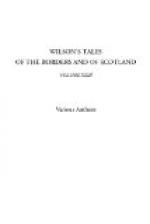And without further interruption than her own laugh, they proceeded till they came to the entry called Big Lochend Close, up which they went some forty or fifty steps till they came to an outer door, which led by a short dark passage to two or three inner doors in succession, all leading to separate rooms occupied by separate people. No sooner had they turned into this passage than they encountered a woman in a plaid and with a lantern in her hand, who had just left the third or innermost room, and whose face, as it peered through the thick folds of her head-covering, was illuminated by a gleam from the light she carried. She gave them little opportunity for examination, having hurried away as if she had been afraid of being searched for stolen property.
“Isbel Napier,” whispered Mrs. Hislop; “she wha first brought evil into the house of the Napiers, with all its woe.”
“And who bodes us small hope here,” said he, “if she has been with the nurse.”
And entering the room from which the ill-omening woman had issued, they found another, even her of whom they were in search, sitting by the fire, torpid and corpulent, to a degree which indicated that as it had been her trade to nurse others, she had not forgotten herself in her ministrations.
“Mrs. Temple,” said Mr. White, who saw the policy of speaking fair the woman who had been so recently in the company of an evil genius; “I am glad to find you so stout and hearty.”
“Neither o’ the twa, sir,” replied she; “for I am rather weak and heartless. Many a ane I hae nursed into health and strength, but a’ nursing comes hame in the end.”
“And some, no doubt, have died under your care,” continued the writer, with a view to introduce his subject; “and therefore you should be grateful for the life that is still spared to you. You could not save the life of Mrs. Napier.”
“That’s an auld story, and a waefu’ ane,” she replied, with a side-look at Mrs. Hislop; “and I hae nae heart to mind it. Some said the lady wasna innocent; and doubtless Mr. Napier thought sae, for he took high dealings wi’ her, and looked at her wi’ a scorn that would have scathed whinstanes. Sae it was better she was ta’en awa—ay, and her baby wi’ her; for if it had lived, it would have dree’d the revenge o’ that stern man.”
“The child!” said Mr. White, “did it die too?”
“Dee! ye may rather ask if it ever lived; for it never drew breath, in this world at least.”
A statement so strange, that it brought the eyes of the two visitors to each other; and no doubt both of them recurred in memory to the statement in the funeral letter, which, whatever may have been the case with the assertion now made by the nurse, never could have been dictated by her they had met in the passage; and no doubt, also, they both remembered the statement made by Mr. Dallas, to the effect that both the mother and child were buried together.




